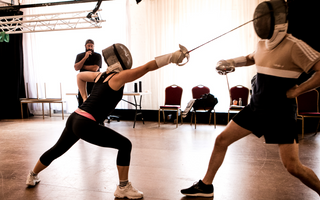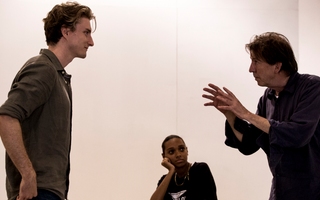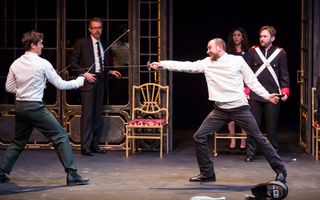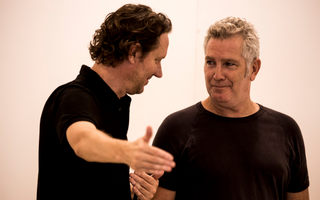 On Stage
On Stage
Read Artistic Director Peter Evans' program note from the 2022 production of Hamlet.
Hamlet is a very personal play. It’s personal to me. It’s about my father. It’s about my mother. It’s about my brother and I and how we are as sons, and it is about my daughter. This feeling I have for Hamlet is not because of any specific event in the play. I have not, thankfully, lost my father and been visited by a ghost who tells me to kill my uncle. But the ideas and relationships in this play speak to me. It resonates and moves me, often to tears.
The concept that art is universal is not as popular as it once was. And for good reason. Individual experiences and points of view are important. Too often cultural assumptions and claims of cultural significance are made by one particular group, and can be oppressive and insensitive. As a Shakespeare nut I see the value in the ability of his plays to speak to everyone and every generation. But perhaps the key is to work with the particular, to allow each audience to relate with their own particularities and viewpoints.
Our production has two elements that on the face of it would seem to make the play less personal to me. We have set the play in the early 1960s and we have cast a female actor in the role of Hamlet. Hamlet is a young man. A student. Struggling with grief. Coming to terms with his mother’s obvious desire for her new husband. Shakespeare is very interested in masculinity and how too often when under pressure, or perceived pressure, men can lash out. Often against women. Working with Harriet on the character of Hamlet is fascinating in this regard. Her point of view makes our exploration of the more troubling aspects of Hamlet’s behaviour more acute and specific. I feel our understanding of Hamlet is richer from having a her, play him.
The 1960s setting reflects a fascinating aspect of the play; its innate nostalgia. The character of Hamlet longs for the past. He has an idealised vision of his father, and his parents’ marriage and former love for each other.
Shakespeare goes out of his way to differentiate Old Hamlet from his usurping brother. Claudius is very much a ‘new man.’ He is a Machiavellian and master politician as opposed to Old Hamlet with his hand to hand combat who is more like a classical Greek hero. The 1960s feels perfect for this play with its glamour, strong design aesthetic, huge cultural and social shifts, rebellious youth, and the existential threat of nuclear war. This nostalgia inspires memory. Perhaps the entire play is a memory of Horatio’s? Or perhaps Hamlet’s and then Gertrude’s, or maybe Ophelia’s? Shakespeare uses theatre as a space for the imagination, for dreams, and for memories. He constantly references the theatre within the theatre. Hamlet is full of ‘plays’ and features an actual play in performance within it. Shakespeare plays with us as an audience of audience. He loves the artificial nature of this art form of time and space. He relishes the moment that we, as audience, allow ourselves to believe what is happening on stage is real.
We aim for the specific in order to explore the universal. The setting is an entry, a jumping off point into the ideas that the play provokes. This is the great engine of Hamlet: his conflict between two irreconcilable actions; to revenge, to murder, to commit a mortal sin, or to not and be a coward, a failed son and child.
My hope is we can all find ourselves in the ideas of this play, not the cultural specificity, not in the period it was written or the period of the production, but in the experience of longing, of grief, of delight, of pain, of being a parent, of being a child, and perhaps, if I may be so bold, of being.
Peter Evans
Artistic Director











